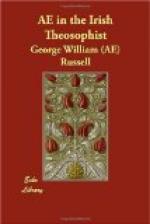“We came to Eri many, many ages ago,” said Labraid; “from a land the people of today hold no memory of. Mighty for good and for evil were the dwellers in that land, but its hour struck and the waters of the ocean entomb it. In this island, which the mighty Gods of Fire kept apart and sacred, we made our home. But after long years a day came when the wise ones must needs depart from this also. They went eastward. A few only remained to keep alive the tradition of what was, the hope of what will be again. For in this island, it is foretold, in future ages will arise a light which will renew the children of time. But now the world’s great darkness has come. See what exhalations arise! What demons would make Eri their home!”
Away at the eastern verge a thick darkness was gathering; a pitchy blackness out of which a blood—red aerial river rolled and shot its tides through the arteries of the night. It came nigher. It was dense with living creatures, larvae, horrible shapes with waving tendrils, white withered things restless and famished, hoglike faces, monstrosities. As it rolled along there was a shadowy dropping over hamlet and village and field.
“Can they not be stayed? Can they not be stayed?” rang the cry of Fand.
The stern look on Cuchullain’s face deepened.
“Is it these pitiful spectres we must wage war against? Labraid, it is enough. I will go—alone. Nay, my brother, one is enough for victory.”
Already he was oblivious of the Sidhe, the voices of Fand and Laeg calling him. A light like a wonder-mist broke dazzling about him. Through a mist of fire, an excess of light, they saw a transcendent form of intensest gold treading the air. Over the head of the god a lightning thread like a serpent undulated and darted. It shed a thousand dazzling rays; it chanted in a myriad tones as it went forward. Wider grew the radiant sphere and more triumphant the chant as he sped onward and encountered the overflow of hell. Afar off the watchers saw and heard the tumult, cries of a horrible conflict, agonies of writhing and burning demons scorched and annihilated, reeling away before the onset of light. On and still on he sped, now darkened and again blazing like the sun.
“Look! look!” cried Laeg, breathless with exultation as the dazzling phantom towered and waved its arms on the horizon.
“They lied who said he was powerless,” said Fand, no less exultant.
“Cu, my darling,” murmured the charioteer; “I know now why I loved you, what burned within you.”
“Shall we not go and welcome him when he returns?” said Liban.
“I should not advise it,” Laeg answered. “Is it to meet that fury of fire when he sinks back blind and oblivious? He would slay his dearest friend. I am going away from here as fast as I can.”
Through the dark forests at dawn the smoke began to curl up from dun and hamlet, and, all unconscious of the war waged over their destinies, children awoke to laugh and men and women went forth to breathe the sweet air of morning.




